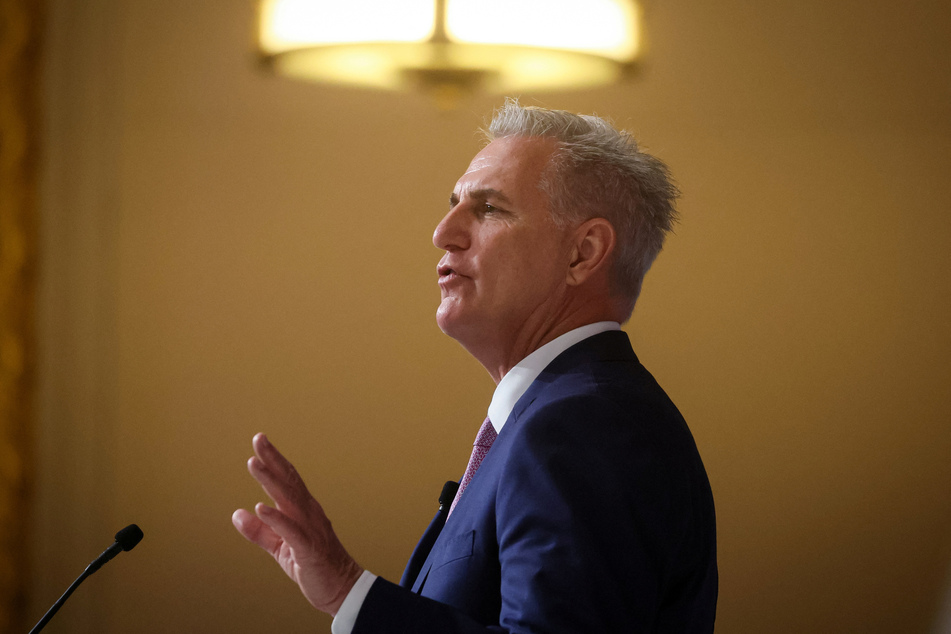House Republicans pass $1.5-trillion debt limit increase with historic spending cuts
Washington DC - US House Republicans narrowly passed legislation Wednesday pairing nearly $4.8 trillion in deficit reduction measures with a debt limit increase into next year – a move they argue should force Democrats to finally negotiate conditions for raising the nation's borrowing limit.

The 222-member House GOP conference largely unified around the bill after weeks of tense negotiations, including last-minute changes leadership reluctantly agreed to include in the wee hours of Wednesday morning.
Ultimately, four Republicans – Tennessee's Tim Burchett, Florida's Matt Gaetz, Colorado's Ken Buck, and Arizona's Andy Biggs – voted against the bill, the maximum number of defections GOP leaders could afford. The 217-215 vote was otherwise along party lines.
Key components of the measure include:
- Raising the debt limit by $1.5 trillion or extending it through March 2024, whichever comes first.
- Cutting and capping discretionary spending for the next decade, starting with a $1.47 trillion topline in fiscal 2024 and allowing for 1% annual growth over the following nine years.
- Repealing most of the energy tax credit provisions from Democrats' 2022 climate, tax, and health law.
- Rescinding unobligated IRS tax enforcement and climate-related grant funds from the 2022 law and unspent Covid-19 relief from various pandemic-era aid packages.
- Canceling US President Joe Biden's student loan forgiveness plan.
- Expanding existing work requirements for the Supplemental Nutrition Assistance Program and Temporary Assistance for Needy Families and instituting new rules for Medicaid beneficiaries.
- Overhauling infrastructure permitting and other energy-related laws and regulations to spur more domestic fossil-fuel production.
- Requiring congressional authorization for major administration regulatory initiatives.
Republicans said the measure reflects the shared priorities of various ideological factions in the conference and serves as their opening offer to Biden and Senate Democrats, who want a clean debt limit increase.
Democrats oppose the debt limit bill

House Democrats all voted against the bill, arguing that Congress should raise the debt limit without conditions. They also slammed the spending cuts in the bill, saying they would have a massive impact on government programs Americans depend on from health care and nutrition services to education and infrastructure.
"There is no way Congress will agree to 10 years of destructive caps and the biggest single cut to non-defense programs in American history," House Budget ranking member Brendan F. Boyle said during debate.
The debt limit "x date" – when the Treasury Department is at risk of running out of cash and wiggle room under the borrowing cap to pay bondholders and other obligations – will hit as early as June. The exact timing will depend in large part on tax receipts the Treasury is still analyzing, but the department plans to release an updated forecast later this week or next.
The Senate is planning to ignore House Republicans' bill, but will be under pressure to either negotiate or act on an alternative plan. Senate Majority Leader Chuck Schumer offered no indication Wednesday that the House vote would change his negotiating posture.
"We think what Speaker McCarthy and the House have done is going to bring us closer to default, not further away from it," the New York Democrat said.
Biden threatens to veto GOP debt limit bill

Biden has threatened to veto the GOP bill and continues to insist on a clean debt limit increase.
The White House had previously signaled Republicans' debt limit bill wouldn't suffice as a plan to kickstart spending negotiations, but on Wednesday issued a statement on the measure that characterized it as a budget.
"House Republicans are selling out hard-working Americans in order to defend their top priority: restoring the Trump tax cuts for the wealthiest and corporations at a cost of over $3 trillion," White House Communications Director Ben LaBolt said. "Budgets are a statement of values – and House Republicans have made clear who they are fighting for."
It's unclear if the White House intentionally referred to Republicans' debt limit bill as a budget to allow Biden to open the door to negotiations or not, but some congressional Democrats are predicting he'll ultimately get there.
Cover photo: Collage: REUTERS

